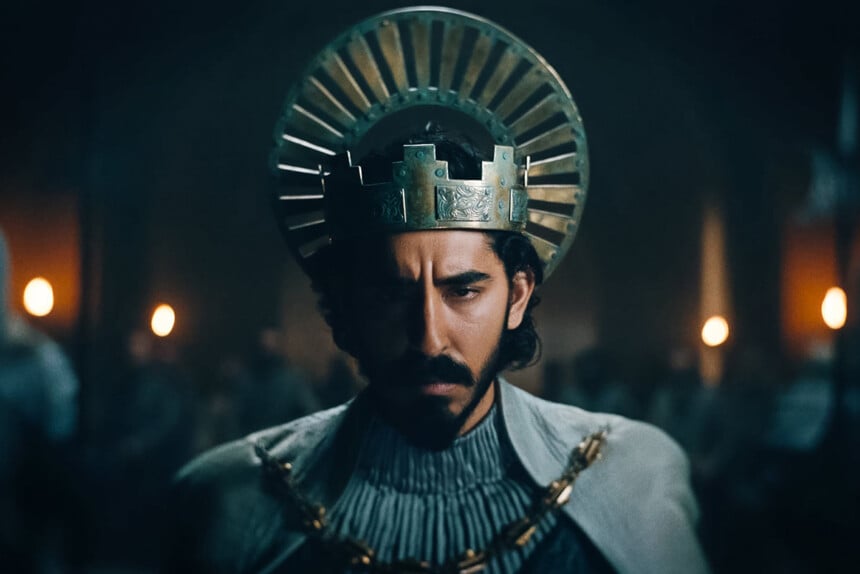Directed and written by David Lowery ◆ Produced by Ley Line Entertainment ◆ Distributed by A24
In a world where chivalry is an alleged tool of the patriarchy, it seems odd that the story of the Green Knight, one of the most famous tales of the Arthurian
legend, remains popular today. Yet it does, as evidenced by the recent release of director David Lowery’s film version of the famous story.
Perhaps it’s not so difficult to understand why the tale won such a following after its initial telling, renewing its appeal in the early 19th century when its original manuscript was rediscovered. It’s a cliffhanger par excellence. Even knowing its outcome, its denouement is irresistible.
The film opens with Gawain (Dev Patel) having a romp in a stable with a young woman, played by the nubile Alicia Vikander. Shortly afterward, Gawain is called to the Round Table in time for him to meet the Green Knight, a giant
creature who has just ridden in on a mission to challenge King Arthur. This is a moment when a knight is supposed to offer service to his liege lord, but they hesitate. Then, seemingly to avert further shame, Gawain leaps into the fray, axing his verdant head off with a single clean blow. But the green guy reaches
down to take up his own head from where it fell, and tells Gawain to meet him at the Green Chapel next Christmas, where he’ll return the favor.
The first thing to say about Lowery’s version of The Green Knight is that its casting seems awry. I found it odd to see Patel, a London actor of East Indian descent, playing King Arthur’s favorite warrior, Sir Gawain. As far as I know, there wasn’t much multiculturalism in England in the ninth century, and it seems unlikely the Round Table had a chair for a brown-skinned Asian. Then again, King Arthur himself was a fiction designed to bolster the self-assurance of the Saxon people.
With this bit of historical anachronism aside, let me say that Patel does well as
Gawain. He plays Gawain as an uncertain neophyte. His brow is frequently furrowed, as he’s often puzzled, worried, and irresolute. You want to pat him on his shoulder encouragingly. Yes, Gawain, you’re suffering, but everything will turn out for the best. Or will it? Lowery has rewritten the narrative to emphasize how unequal Gawain is to the challenges that await him.
Well before the following Christmas, we witness our not-so-gallant hero leave
his home in search of the Green Chapel. As he trots along on a well-trodden path, he looks glumly apprehensive. His worries begin to multiply, as he encounters three young witches, who very capably best him in a struggle on the surrounding sward. He soon finds himself on his back helplessly tied up.
Fortunately, Gawain is provided help from a talking fox and the beheaded Winifred, patron saint of Wales, who lost her own head after a suitor became irate when he learned that she had thoughtlessly decided to enter a convent. To alter the common saying, all’s not fair in love and war.
Matters become even more fraught when Gawain reaches what he’s told is the Green Chapel, whose lord, Sir Bertilak (Joel Edgerton), strikes a deal with the bewildered hero. Bertilak will provide lodging and sustenance on condition that the two men will honorably exchange gifts with one another at each day’s end as Gawain’s sojourn continues. Bertilak will give the catch of his daily hunt and Gawain, in return, will pay whatever he wins in the castle.
Since Gawain has already agreed to stay at the castle, he’s obliged to limit himself to what he can “win” within its walls. This turns out to be Bertilak’s wife, played once again by Vikander, now wearing a red satin dress. According to courtly custom, Gawain is expected to honor this seductress’s requests. Since she’s married, however, doing what she wants would violate Gawain’s knightly purity. Suffice it to say that Gawain’s sexual test is cut off rather, ahem, prematurely. He plants his kisses on the lord instead, and in the end a woman
wears the crown.
All this reminds me of Geoffrey Chaucer’s bawdy Wife of Bath, who in another
mood insists that she be honored for her forthright claim to sexual equality. And here we are, worried about the patriarchy. ◆
Image Credit:
above: Dev Patel in The Green Knight (2021)



Leave a Reply